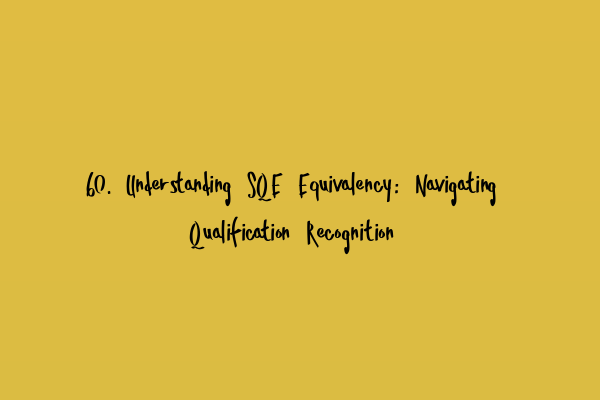Understanding SQE Equivalency: Navigating Qualification Recognition
Are you considering a career in law or looking to progress in your legal profession? The Solicitors Qualifying Examination (SQE) is a new pathway to qualifying as a solicitor in England and Wales. This article will help you understand the concept of SQE equivalency and provide guidance on how to navigate qualification recognition in this changing landscape.
What is SQE Equivalency?
SQE equivalency refers to the process of determining the comparability of qualifications obtained outside of the traditional English and Welsh legal education system. As the SQE is a new examination, it is important for those with existing legal qualifications to understand how their credentials may be recognized under this new framework.
Previously, the Qualified Lawyers Transfer Scheme (QLTS) provided a route for lawyers qualified in other jurisdictions to qualify as solicitors in England and Wales. However, with the introduction of the SQE, the QLTS will be phased out, resulting in a need for an updated approach to qualification recognition.
Under the SQE, candidates with non-UK legal qualifications or work experience can seek recognition of their prior learning and experience. The Solicitors Regulation Authority (SRA) will assess the level and relevance of their qualifications to determine if any exemptions can be granted from the SQE assessments.
Navigating Qualification Recognition
If you hold non-UK legal qualifications, it is essential to understand the process of qualification recognition to maximize your chances of exemption from certain SQE assessments. Here are some steps to help you navigate this process:
1. Research the SRA’s Qualification Recognition Policy
The SRA has published a Qualification Recognition Policy that outlines its approach to assessing the equivalence of qualifications obtained outside of England and Wales. Familiarize yourself with this policy to understand the criteria and standards that will be applied during the assessment process.
As you research, you may find it helpful to refer back to our related articles on SQE 1 Practice Exam Questions and SQE 1 Practice Mocks FLK1 FLK2 for additional resources.
2. Prepare Your Application
Gather all relevant documents, including transcripts, course syllabi, and any other supporting evidence that demonstrates the nature and content of your legal qualifications. You may also need to provide evidence of your work experience, including duration, responsibilities, and areas of practice.
To further enhance your preparation, consider enrolling in SQE 1 Preparation Courses to strengthen your knowledge and increase your chances of obtaining exemptions.
3. Submit Your Application to the SRA
Submit your application for qualification recognition to the SRA, ensuring that you provide all the necessary documentation and information. The SRA will review your application and assess the relevance and level of your qualifications based on their Qualification Recognition Policy.
While waiting for the SRA’s decision, it is advisable to begin preparing for the SQE assessments in case you are not granted any exemptions. SQE 2 Preparation Courses can help you develop the necessary skills and knowledge required for the assessments.
4. Benefit from Exemptions
If the SRA determines that your qualifications are equivalent to the SQE assessments, you may be granted exemptions from specific parts of the SQE. This means that you will not be required to sit those assessments, saving you time and resources.
Once you have received your exemptions, it is important to stay updated with the SRA SQE Exam Dates, so you can plan your study and examination schedule accordingly.
5. Complete the SQE Assessments
If you do not obtain any exemptions or are only partially exempt, you will need to complete the relevant SQE assessments to qualify as a solicitor. Ensure that you follow a structured study plan and utilize study materials, such as the SQE 1 Practice Exam Questions and SQE 1 Practice Mocks FLK1 FLK2, to enhance your preparation.
By carefully navigating qualification recognition and understanding the process, you can effectively chart your path towards qualifying as a solicitor under the SQE.
Conclusion
As the legal education and qualification landscape evolves, understanding SQE equivalency and qualification recognition becomes crucial for aspiring solicitors with non-UK legal qualifications. By researching, preparing, and submitting a well-documented application to the SRA, you can increase your chances of obtaining exemptions from certain parts of the SQE assessments.
While waiting for the SRA’s decision, it is important to focus on your preparation for the SQE assessments. Utilize study materials, practice exam questions, and preparation courses, such as our SQE 2 Preparation Courses and SQE 1 Preparation Courses, to enhance your knowledge and skills.
Remember, staying up to date with the SRA SQE Exam Dates is essential to plan your study and examination schedule effectively. With the right approach and dedication, you can successfully navigate qualification recognition and achieve your goal of becoming a solicitor under the SQE.
For further information and resources, refer back to our related articles mentioned throughout this post.
